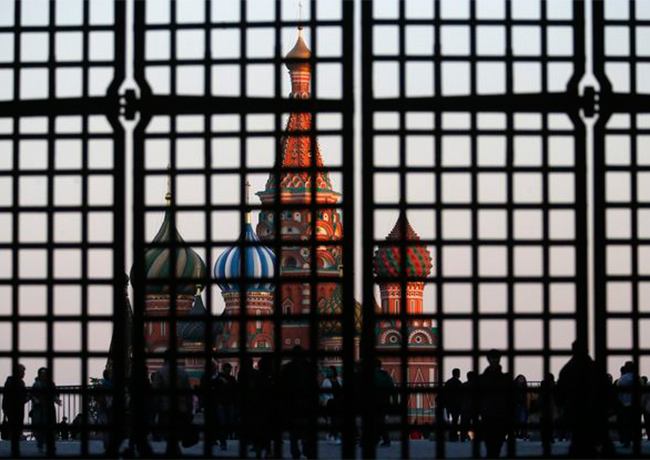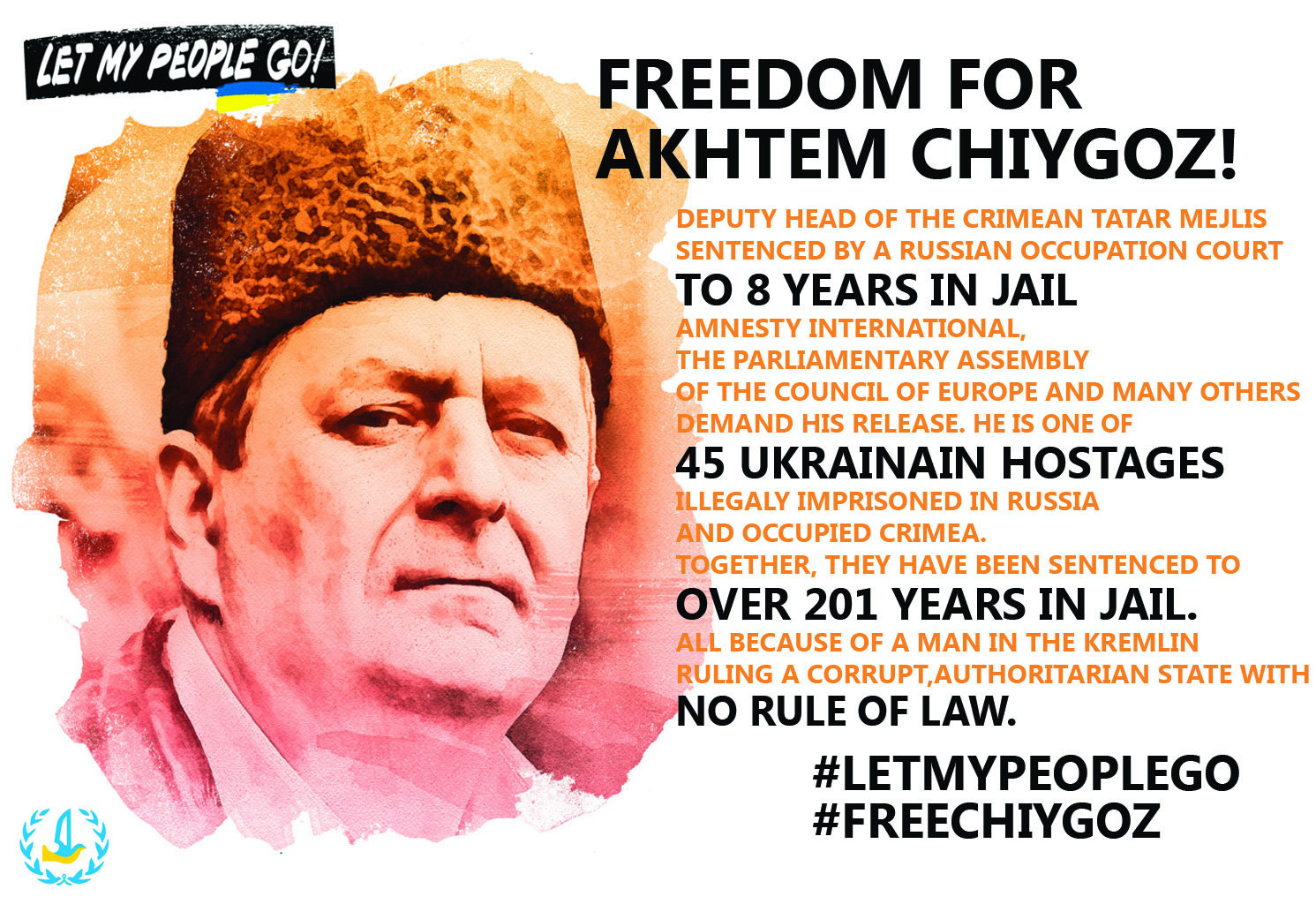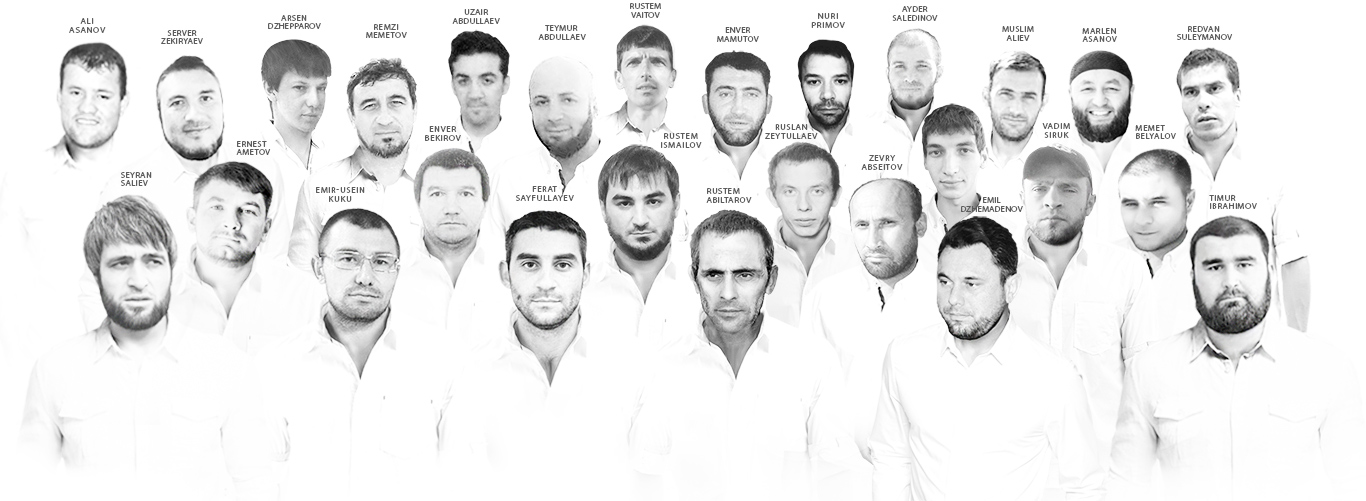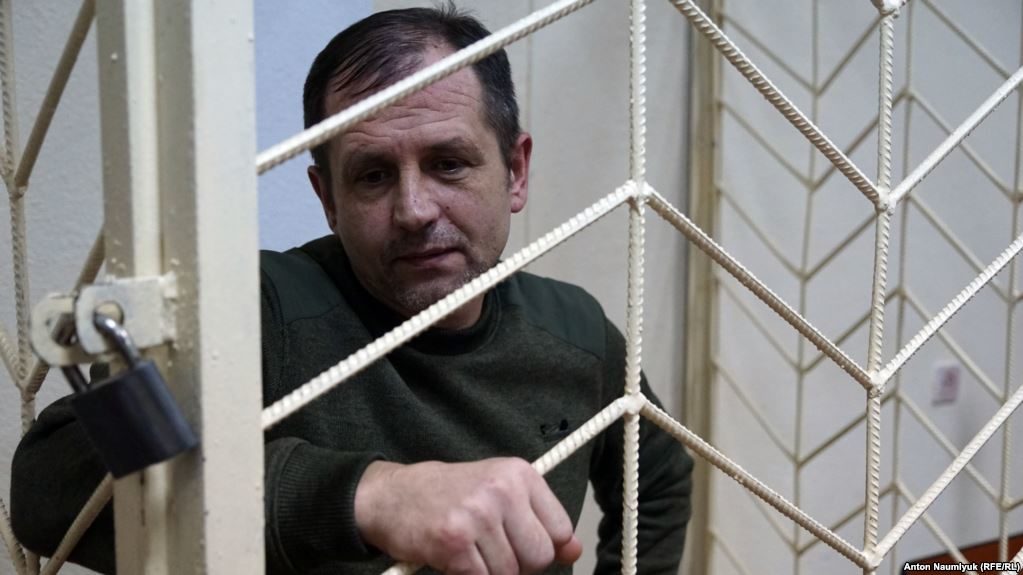The opening of Oleh Sentsov’s hearing in the Northern Caucasus regional military court of Russia has again turned attention to Ukrainian political prisoners. However, media reports and statements from politicians primarily refer to only three individuals - Nadia Savchenko, Oleh Sentsov and Oleksandr Kolchenko. But according to Ukrainian special services, dozens of Ukrainian citizens are held illegally in Russia, and the names and conditions of detention of only eleven are accurately known.
Insider could speak with the families and lawyers of just five individuals. Each case was practically a crime thriller. We have love, revenge and bland servility. We cannot be certain that the words of prisoners’ families are entirely true, but we are convinced that these people, whose problems are almost never written about in the media, suffer no less than the families of better known political prisoners.
Stanislav Klykh. Treacherous love
On the phone, Tamara Klykh often breaks down and weeps. Several heavy problems have fallen on the shoulders of the 71 year old woman. Her son, Kyiv historian Stanislav Klykh, has been held in Russian jails for over a year. In Oryol, in Pyatigorsk, in Nalchik. Currently, Stanislav is in Yesentuky. On August 21 he is to be judged, probably in Grozny, near the “scene of the crime”. He is accused of participating in the 1994-1995 Chechen war [Russia’s war against a North Caucasus breakaway republic of Chechnya], even though at that time he was a university student, graduating in 1996.
“He may not even be able to assemble an assault rifle,” the woman laments. “He is a completely nonviolent, cautious boy. Once he was driving and collided with a Kamaz truck, and since then he doesn’t even sit behind the wheel.”
The only thing that the Russians can accuse Klykh of, according to Tamara, is patriotism. Since he was in eighth grade, Stanislav has normally communicated in Ukrainian, even prior to Ukraine’s independence. He would not rise for the Soviet anthem on principle. He participated in the Student revolution in 1990, camping at the Maidan. In Russia, Klykh is alleged to be a “Right Sector” activist (RS being a one-size-fits-all Ukrainian nationalist scapegoat in Russia), but according to his mother, her son was not involved in the organization. He had been involved in UNA-UNSO (a precursor of Right Sector) at some point, but he left the organization when it became inactive.
“He wasn’t even very active during Euromaidan, he only went out a few times.” his mother said. “He supported it, and once took his girlfriend there. But she didn’t like it so they left.”
Klykh’s mother suspects his girlfriend, medical doctor Viktoria Symonov, of turning her son over to Russian authorities.
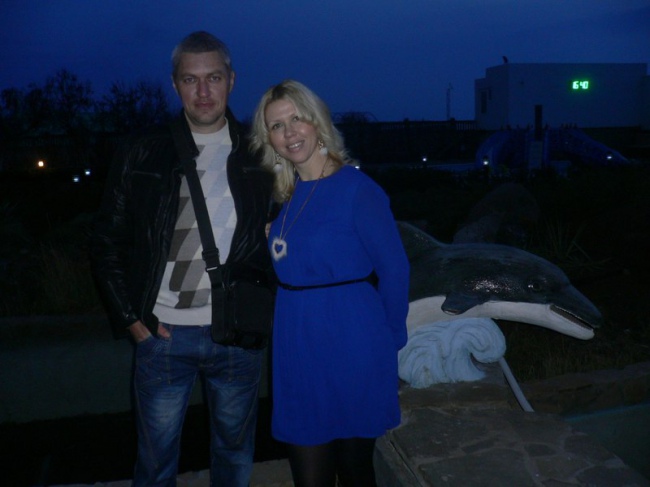
“He had been vacationing in Skadovsk and met a girl from Oryol. She visited us twice and praised him so much: ‘I have never seen such a man, I’ll be happy with him.’ He also visited her. And when he was there last August, FSB agents entered his hotel room: ‘Are you with the Right Sector?’ ‘No, what Right Sector?’ ‘Come with us.’” Tamara recounts.
First Klykh was held for 15 days for “opposition to law enforcement agencies”, a standard initial charge in Russia. Then they began to delve into the case and to come up with new allegations. Klykh’s girlfriend has not communicated with his parents since his arrest. She does not answer the phone. She has told other journalists that during Stanislav’s last visit they fell out and she had no further involvement in his life.
Plenty of other people and organizations have also expressed indifference. His family has written to Russian Foreign Minister Sergey Lavrov. Silence. The Ukrainian Foreign Ministry initially said they would help pay legal fees, then clarified that funds were not available. Klykh’s parents, Tetyana and Roman, are simple pensioners, living in a decrepit Soviet-era apartment building in Kyiv’s Voskresenka district. Until recently, they didn’t even have a bank account to accept financial aid from sympathetic donors. They saved up the money for legal fees themselves.
“God forbid that we end up like Sentsov or Savchenko, of course, there is grief enough to go around.” she says. “But our grief is compounded. At least they have help, financial aid. But we have no idea where to get this money.”

A Russian lawyer named Maryna Dubrovina works with Stanislav. She discovered him first in Nalchyk, then in Yesentuky, because Russian authorities try to hide his place of detention. Last week, Dubrovina flew to Kyiv to collect documents required for the court: references from his schools and employers. She brought his parents news from their son: he is evidently being beaten. He wrote many letters to his parents, but only one arrived, written in Russian under the supervision of guards. In jail he is told that his parents have left him to his fate, that his friends have renounced him. During his last talk with his lawyer, Stanislav broke down in tears.
Stanislav’s parents sent along a parcel for their son with his lawyer. Among the items were an icon and a cross because those he had were taken by the Russians.
This week, Stanislav Klykh’s parents finally opened an account at Privatbank. The number is 5168 7572 9496 4939.
Mykola Karpiuk. No legal representation
While a lawyer in Klykh’s case is still trying to influence his fate, another Ukrainian held in Russia, 50 year old Mykola Karpiuk, has been left to fend for himself. Many lawyers have sought to become his advocates, including Nadia Savchenko’s lawyer Mark Feygin. After a few days, according to Karpiuk’s wife Olena, each lawyer is rejected, allegedly on the basis of Mykola’s statements. The prosecutor does not want to meet with lawyers, there are constant evasions, he is never in.
“I don’t even know if it’s worth hiring someone to stir this up.” his wife says.
Like Stanislav, Mykola is accused of participating in the Chechen war. Karpiuk did indeed participate in fighting - in Transnistria and Abkhazia. In Chechnya, his family is certain, he did not. However, Olena Karpiuk cannot provide proof of his alibi. This was 20 years ago, what proofs could remain?
Why, at the height of the conflict with Russia, a man who was active in the “Right Sector” would choose to go there, Olena does not know.
“I would like to know that myself. He didn’t explain anything to me. On March 17, just after the Crimean “referendum”, he said he was going on a mission. Where exactly, he didn’t say.”
In February, he was given an opportunity to write a letter, an official one, in Russian. He reported that “detention conditions are normal”.
The Karpiuk and Klykh cases are grouped together. If the charges are upheld, the men face up to 15 years in prison.
Serhiy Lytvynov. Village idiot
Serhiy Lytvynov of Stanytsya Luhanska district became a symbol in Russian media of how monstrous Ukrainian volunteer fighters are. The accusations which are “pinned” on the 31-year-old man are easy to portray in vivid televised images: Lytvynov, a fighter in the “Dnipro-1” volunteer battalion, allegedly killed 30 men and raped and killed 8 women, as well as a 12-year-old girl. I call Serhiy’s common-law wife Olena. I hear a raspy voice, typical of people who enjoy having a drink.
“I don’t know what’s going on, he doesn’t call. Apparently he was taken to Rostov.” Olena says slowly, stretching out the sounds. “Not a sound, not a breath from him. How is he treated? Do I know? I won’t lie to you, it would be better for you to speak to the lawyer.”
His lawyer, Viktor Parshutkyn, a Moscow attorney and historian, researches ancient Slavs. He has undertaken the defense for free - he does so when the case is interesting. And this case has many interesting details.
Here is the first version of events, outlined by Serhiy Lytvynov himself. Last August Lytvynov developed a dental abscess. He decided to get it treated in Russia, traveling to Tarasovsky District Centre, which is 40 km away from Lytvynov’s birthplace, Komyshne. He left on August 13 and was arrested in the hospital there on August 22. Because in his ward there were many “pro-Russian rebels”, to whom Lytvynov allegedly boasted about his exploits in the Dnipro-1 battalion.

“And here the inconsistencies begin.” Parshutkyn says. “First of all, according to documents seized in the hospital, he had already undergone surgery on August 12. Second, dental abscess is normally treated on an outpatient basis. It’s cut open, the oral cavity is cleaned and the patient is sent home. Holding a patient for 10 days in the hospital for dental abscess is certainly excessive. Third, no victim in the case has been identified. Eyewitness testimony of those said to have heard his stories have corroborated nothing. Currently they assert that Lytvynov never spoke to them about his participation in Dnipro-1 at all, nor about participation in any fighting, never mind murder and rape.
Further - more oddities. Lytvynov has a brother, who stated, when I spoke to him, that his bad tooth is a lie. Then, since all conversations are monitored, the brother was obviously instructed, and from then on he “sang” that Serhiy went to treat a dental abscess. Another relative, when asked by Ukrainian human rights worker Maria Tomak why Serhiy went to Russia, responded “To seek protection.” At this point, we learned that Lytvynov’s younger brother Vitalik traveled to Russia with his family in July of 2014 and obtained refugee status there. Furthermore, we discovered that for some reason, Lytvynov took his wife’s passport and birth certificate with him “to the hospital”. He now says he took them by mistake.
“Another detail: from other Komyshne villagers who had moved to Russia, I discovered that Serhiy was constantly “cozying up” to the Ukrainian roadblock, which was set up near the town. He would bring them moonshine sometimes, other times something else. So he knew the faces of the Ukrainian fighters and other valuable information,” says the lawyer.
Viktor Parshutkyn believes that the entire story about treating a dental abscess in the hospital is a cover. In reality, Lytvynov sought to obtain refugee status in Russia, which Russian authorities may have offered him in exchange for information about Ukrainian fighters and about militants who were being treated in the Tarasovsky hospital. He was there “sniffing out” interesting information. When they realized that Lytvynov was a simple-minded person, they decided to use him “in full”. “Like a kamikaze”, says the lawyer.
According to the prosecutor’s version, it seems that one evening the boys in the hospital drank some vodka and Lytvynov told such tales to the militants that they took him out, beat him up and handed him over to the FSB.
The victims of Serhiy’s alleged killings appeared on state television channels, particularly NTV. Then he was taken with the “insurgents” to Rostov for questioning, and the case began to crumble. However, the only Russian newspaper that reports this is Kommersant.
The Russian regime, naturally, cannot admit its error. Moreover, not a single Russian citizen is among Lytvynov’s supposed victims. So the authorities invented a new crime: pillaging, says the lawyer.
“Under this charge, however, Lytvynov is a simple civilian, not a fighter in some battalion. Allegedly, he and two unknown fighters of the Ukrainian National Guard (though it is unclear how the investigator knows that they are National Guardsmen if their identities are unknown) arrived at the property of a Russian citizen, Andriy Lysenko, who happened to be staying in Ukrainian territory. After allegedly threatening him by hitting him with the butt of a Kalashnikov automatic, they proceeded to take two cars from him. One was a UAZ missing a battery, the other an old Opel.” Parshutkyn tells Insider.
This charge was presented to Serhiy on August 8, 2015. But still nothing is working out for the prosecution: they can find no trace of either the injured Andriy Lysenko or the witnesses.
The permitted term of custody for Lytvynov ends on August 22, but his lawyer believes that his detention will be extended for several months. Then, the lawyer believes, the court will resolve to return the case for additional investigation. In Russia, this is the standard way to close cases without spoiling prosecution statistics.
Is Lytvynov being tortured?
His lawyer has only been working with him since April, and on their first meeting there were no signs of assault on his face, apart from an old scar on his right cheek from the dental abscess. But there are injuries on his body.
“Lytvynov has shown me his right thigh - it is scarlet. It appears that they went over it with something metal, peeled the skin, and left it like that. Though his testimony is confused: first he says one group beat him, then another, then a third, at one time, then at a completely different time.” says the lawyer.
“You know, as a lawyer, I am coming to the conclusion that Lytvynov voluntarily came to Russia and agreed to participate in this shameful operation, ‘sniffing out’ information on the neighbours in his ward.” says the lawyer. “Then the authorities used him this way. Lytvynov is an idiot, a real village idiot. But whatever sort of man he may be, if he did not commit the acts he is accused of, he needs protection.”
Yuriy Soloshenko. In jail at 73
In the summer of 2014, Yuriy Soloshenko, the director of the Znamya defense manufacturing plant in Poltava, began to receive regular emails. They referred to a convenient opportunity to purchase equipment in Russia that would help Soloshenko’s business. His family tried to dissuade Yuriy. They noted that relations with the neighbouring country are tense, the risk of getting into trouble is high. He decided to go, because he would be met in Russia by long-standing professional acquaintances. Soloshenko was arrested on the spot and accused of spying. They say he was intending to buy equipment which is the subject of military secrets. The sentence for such a charge is from 12 to 20 years in jail. The case is already going to trial, the court date will be set for August or September.

Yuriy’s son Oleksandr does not believe that his father will be acquitted, even though he is convinced of the absurdity of the charges.
“First we were shocked by the arrest, then by the prosecution and the versions of events. After all this, sentencing a senior seems completely predictable.” the son says.
According to Oleksiy, the substance of the case is this. Znamya factory produces so-called traveling-wave tubes for air defense. Since independence, Ukraine has not placed any orders with the factory, which was saved from bankruptcy by the director’s relationships with Russian military personnel, who did place some orders. These tubes are used in air defense systems in countries throughout the former Soviet bloc and its satellites (such as India), and they need to be regularly replaced. So Znamya had work and money to pay its workers. Every year, professionals from this field gathered for a conference in Sochi. They all knew each other.
The Russian side at these meetings and negotiations was represented, among others, by a high ranking military man. According to Oleksandr, he was corrupt: “he had such wealth he couldn’t find a place to bury it all”. And he had his fangs out for Soloshenko:
“A woman traveled from our factory for the negotiations, and she became his mistress. She asked my father to be sent on business trips, so that they could meet more frequently.” says his son. “But since business travel is expensive, and per diems are high, father declined: the factory was ‘screwed’ even without this. The Russian was offended.”
Soloshenko’s son believes that this same Russian “partner” framed his father. Possibly for monetary gain and possibly just to curry favor, he provided the authorities with a “spy”.
Now, Soloshenko’s lawyers are regularly changed, and those proposed by his son are often simply not granted access. The Ukrainian consul was allowed to see him only after a year. Lawyers say that this sometimes happens, when there is pressure on the case “from above”.
“Father sits in Lefortovo, perhaps the best prison in Russia. Everything is alright for him there, he is respected, we see each other, recently they have started permitting phone calls. Apart from the bags under his eyes, he is fine. Another thing, the schedule there is completely different. Psychologically, in general.” the son comments.
In Oleksandr’s opinion, his father can only be freed through an exchange with one of the Russians held in Ukraine. On the Ukrainian side, Soloshenko is indeed one of the priorities for prisoner exchange (although prosecutors in Moscow assure the man that Russia is offering to exchange him and that the Ukrainians refuse). But as of now there have been no exchanges between Ukraine and Russia. Progress is blocked.
Could Yuriy Soloshenko have truly taken military secrets from Russia?
“For the love of God, I beg you. This technology is from the last century.” Oleksandr states categorically. “And at Znamya, the tech was already outdated long ago. Its production is only useful because ancient air defense systems are still operational. New systems are completely different. What’s more, last December, another Ukrainian man, a young one maybe 30 years old, took equipment like my father was allegedly planning to sell from Ukraine. He was simply expelled from Russia, they didn’t do anything to him. That’s why it’s clear that the essence here is political. I’ve known my father to be an honest man his entire life, he never took any risks. He always tried to live in peace and sleep in peace. And there was nothing shady about this agreement to him.”
“It’s frustrating that a man who spent half his life working for the good of Russia is now on trial there,” Oleksandr adds.
Viktor Shur. 20 years for photographs of an overgrown field
In his youth, Viktor Shur was an oilman, and lived with his family in Surgut in western Siberia. On acquiring a pension, he returned to his native Chernihiv. Oilmen have high pensions, so 58-year-old Viktor decided not to change his citizenship. He became an antiquarian, buying up and selling coins, medals, paintings and so on. This was the family business. Viktor’s father is a collector famed throughout the country, whose customers included Viktor Yushchenko and Yulia Tymoshenko. Shur often travelled through the country and into Russia on business. After one of these visits, he was unable to leave Russia.
We speak about this with Viktor’s son Valeriy. He lives in Kyiv, working as a manager in a construction firm. Valeriy’s nerves have been notably stressed during the last year. Several times he clarifies my name and surname, the name of the publication. There are many things he did not want to speak of over the phone. And during our meeting, held in a crowded place, he clutched a small pair of scissors tightly in his fist practically throughout.
“On the 9th of December 2014, he left for a regular trip to Bryansk. He planned to have one meeting and return the same day. He even left his Russian cell phone at home. He got held up, didn’t return the following day, nor the day after that. These delays sometimes happened, and they had not been a reason for concern in the past. But on the third day we sounded the alarm. Father traveled by car, and I called every state agency both in Russia and Ukraine to determine whether a car like his had gotten into an accident. It had not. I called all the morgues and hospitals - he wasn’t there. Then I filed a complete Russia-wide search. But my SBU [Security Service of Ukraine] friends said that he had been detained by the FSB at the border when he was trying to leave for Ukraine.”
So Viktor was being held somewhere. But he wasn’t found in any jail or penitentiary. On the 13th of December, he made one call to the woman he lived with from an unknown number. He dejectedly stated that he was alive and well and that he would return in a week. The conversation lasted 10 seconds.
“Probably, he was being held in some unlisted ‘monkey house’ jail, which doesn’t show up on any database. Even a general of the FSB, our distant relative, was unable to find him,” Valeriy explains.
On December 25, Valeriy traveled to Bryansk to search for his father. Through acquaintances in the Russian Prosecutor’s office and FSB it became apparent that the previous day Viktor had been transferred to Moscow. That day, on the 24th of December, he had signed some papers at the request of the prosecutor. The State Attorney assured him that if he signed he would be released. As soon as he signed, he was accused of spying. For this charge, he is facing 12 to 20 years in prison.
His son laments that his father first called his lover rather than his son. He believes that at that time there was still a chance to save him. Because the reason for arrest was, as in the case of Stanislav Klykh, “disobedience to law enforcement agencies.”
His son is convinced that Shur was not involved in any kind of spying in Russia. Yes, Viktor supported the Maidan, and had little Ukrainian flags and stickers with him, which he handed out in Bryansk and Moscow. He spoke with friends and argued that there was no junta in Ukraine and that children were not eaten here. But nothing radical.
All charges against Shur are based on photographs which he took.
“The whole case is built on photos on his camera of some field, which is supposed to be a military facility.” says Valeriy. “As was later revealed by the lawyer, this photograph really does show the military airfield in Bryansk, but it is currently a field, overgrown with weeds, where cows wander around, and the runway is broken. The airfield has certainly not been used since the 1980s, it exists only on paper. It is in fact an overgrown field and nothing more.”
“I don’t know whether my father took the photo or not. During our meetings he can not speak about it. He says ‘I signed the papers and now, obviously, I regret it.’”
Viktor’s trial was supposed to take place in May. But it appears there was a lack of physical evidence, and he was asked to sign more papers. And he did this. Shur knowingly cooperated with the prosecutors. All to avoid a maximum sentence. All that Valeriy and his family want is to avoid taking away the final productive 20 years of his father’s life. Those who cooperate may be given a sentence below the legislated minimum. They can even sentence him to “just” four years.
“There is no doubt at all that he will be sentenced or that the case will be taken through to its end, because there is no fairness or justice in Russia,” Valeriy is convinced. “The choice here is simply between two evils. My father’s position: it’s better to cooperate and get less, than to refuse to cooperate and get sentenced to life in prison.”
The author thanks the Center for Civil Liberties for their help.

